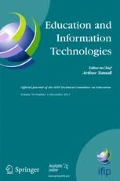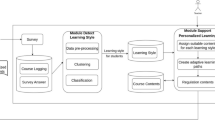Abstract
This paper proposes an automatic approach that detects students’ learning styles in order to provide adaptive courses in Moodle. This approach is based on students’ responses to the ILS and the analysis of their interaction behavior within Moodle by applying a data mining technique. In conjunction to this, an adaptive mechanism that was implemented in Moodle is presented. This adaptive mechanism builds the user model based mainly on the proposed approach for automatic detection of learning styles in order to adapt the presentation and the proposed navigation to students’ different learning styles and educational objectives. An evaluation study was conducted to evaluate the proposed approach for automatic detection of learning styles and the effect of the adaptive mechanism. Two groups of students were formed, namely the experimental and the control. The first had access to a Moodle course that automatically detected their learning styles and exploited the adaptive mechanism, whilst the second had access to the standard version of a Moodle course. The results were promising since they indicated that our proposed approach for automatic detection of learning styles attained adequate precision compared to other works, even though the patterns considered are less complex. Additionally, the results indicated that the adaptive mechanism positively affected students’ motivation and performance.




Similar content being viewed by others
References
Akbulut, Y., & Cardak, C. S. (2012). Adaptive educational hypermedia accommodating learning styles: A content analysis of publications from 2000 to 2011. Computers & Education, 58, 835–842.
Alharbi, A., Paul, D., Henskens, F., & Hannaford, M. (2011). An Investigation into the Learning Styles and Self-Regulated Learning Strategies for Computer Science Students. In G. Williams, P. Statham, N. Brown, & B. Cleland (Eds.), Proceedings of ASCILITE - Australian Society for Computers in Learning in Tertiary Education Annual Conference 2011. Australasian Society for Computers in Learning in Tertiary Education 2011 (pp. 36–46).
Alkhuraiji, S., Cheetham, B. M. G., & Bamasak, O. (2011). Dynamic adaptive mechanism in learning management system based on learning styles. In Proceedings of the 11th IEEE International Conference on Advanced Learning Technologies (ICALT 2011) (pp. 215–217). Athens: IEEE Computer Society. https://doi.org/10.1109/ICALT.2011.69.
Atman, N., Inceoğlu, M. M., & Aslan, B. G. (2009). Learning Styles Diagnosis Based on Learner Behaviors in Web Based Learning. In O. Gervasi, D. Taniar, B. Murgante, A. Laganà, Y. Mun, & M. L. Gavrilova (Eds.), Computational Science and Its Applications - ICCSA 2009, LNCS (Vol. 5593, pp. 900–909). Berlin, Heidelberg: Springer.
Karagiannis, I., & Satratzemi, M. (2017). Enhancing Adaptivity in Moodle: Framework and Evaluation Study. In M.E. Auer, D. Guralnik, & J. Uhomoibhi (Eds.), Interactive Collaborative Learning (ICL2016), Advances in Intelligent Systems and Computing (Vol. 545, no. 2, pp. 575–589). Cham: Springer.
Bachari, E., Abelwahed, H., & Adnani, M. (2011). E-learning personalization based on dynamic learners’ preference. International Journal of Computer Science & Information Technology (IJCSIT), 3(3), 200–216.
Beck, J., Stern, M., & Haugsjaa, E. (1996). Applications of AI in Education. ACM Crossroads Student Magazine, 3(1), 11–15.
Brusilovsky, P. (1996). Methods and Techniques of Adaptive Hypermedia. User Modeling and User-Adapted Interaction, 6(2-3), 87–129.
Brusilovsky, P. (2001). Adaptive hypermedia. User Modelling and User Adapted Interaction, 11, 87–110.
Cabada, R. Z., Estrada, M. L. B., Angulo, V. P., García, A. J., & García, C. A. R. (2010). Identification of Felder-Silverman Learning Styles with a Supervised Neural Network. In D. S. Huang, X. Zhang, C. A. R. García, & L. Zhang (Eds.), Advanced Intelligent Computing Theories and Applications with Aspects of Artificial Intelligence, LNCS (Vol. 6216, pp. 479–486). Berlin: Springer-Verlag.
Cabada, R. Z., Estrada, M. L. B., & García, C. A. R. (2011). EDUCA: A web 2.0 authoring tool for developing adaptive and intelligent tutoring systems using a Kohonen network. Expert Systems with Applications, 38(8), 9522–9529.
Carver, C. A., Howard, R. A., & Lane, W. D. (1999). Addressing different learning styles through course hypermedia. IEEE Transactions on Education, 42(1), 33–38. https://doi.org/10.1109/ 13.746332.
Cha, H. J., Kim, Y. S., Park, S. H., Yoon, T. B., Jung, Y. M., & Lee, J. H. (2006). Learning Style Diagnosis Based on User Interface Behavior for the Customization of Learning Interfaces in an Intelligent Tutoring System. In M. Ikeda, K. D. Ashley, & T. W. Chan (Eds.), Proceedings of the 8th International Conference on Intelligent Tutoring Systems, LNCS (Vol. 4053, pp. 513–524). Berlin: Springer-Verlag.
Coffield, F., Moseley, D., Hall, E., & Ecclestone, K. (2004). Learning Styles and Pedagogy in Post-16 Learning: A Systematic and Critical Review. London: Learning and Skills Research Centre/ University of Newcastle upon Tyne.
Crockett, K., Latham, A., & Whitton, N. (2016). On predicting learning styles in conversational intelligent tutoring systems using fuzzy decision trees. International Journal of Human Computer Studies, 97, 98–115.
Despotovic-Zrakic, M., Markovic, A., Bogdanovic, Z., Barac, D., & Krco, S. (2012). Providing Adaptivity in Moodle LMS Courses. Journal of Educational Technology & Society, 15(1), 326–338.
Dung, P. Q., & Florea, A. M. (2012). An approach for detecting learning styles in learning management systems based on learners’ behaviours. In International Conference on Education and Management Innovation (Vol. 30, pp. 171–177). Singapore: IACSIT Press.
Felder, R. M., & Silverman, L. K. (1988). Learning and teaching styles in engineering education. Engineering Education, 78(7), 674–681.
Felder, R. M., & Soloman, B. A. (1997). Index of Learning Styles Questionnaire. Retrieved 12 Oct 2013, from http://www.engr.ncsu.edu/learningstyles/ilsweb.html.
Felder, R. M., & Spurlin, J. (2005). Applications, Reliability and Validity of the Index of Learning Styles. International Journal of Engineering Education, 21(1), 103–112.
Felder, R. M., Felder, G. N., & Dietz, E. J. (2002). The effects of personality type on engineering student performance and attitudes. Journal of Engineering Education, 91(1), 3–18.
Feldman, J., Monteserin, A., & Amandi, A. (2015). Automatic detection of learning styles: State of the art. Artificial Intelligence Review, 44(2), 157–186.
García, P., Amandi, A., Schiaffino, S. N., & Campo, M. R. (2007). Evaluating Bayesian networks’ precision for detecting students’ learning styles. Computers & Education, 49(3), 794–808.
Graf, S. (2007). Adaptivity in Learning Management Systems focusing on learning styles. PhD dissertation, Faculty of Informatics, Vienna University of Technology, Austria. Retrieved from http://sgraf.athabascau.ca/publications/PhDthesis_SabineGraf.pdf.
Graf, S., Kinshuk, & Liu, T. C. (2009). Supporting Teachers in Identifying Students' Learning Styles in Learning Management Systems: An Automatic Student Modeling Approach. Journal of Educational Technology & Society, 12(4), 3–14.
Graf, S., Kinshuk, & Ives, C. (2010). A Flexible Mechanism for Providing Adaptivity Based on Learning Styles in Learning Management Systems. In Proceedings of the 10th IEEE International Conference on Advanced Learning Technologies (ICALT 2010) (pp. 30–34). Sousse: IEEE Xplore. https://doi.org/10.1109/ICALT.2010.16.
Gregorc, A. F. (1979). Learning/teaching styles: Their nature and effects. In Student learning styles: Diagnosing and prescribing programs (pp. 19–26). Reston: National Association of Secondary School Principals.
Honey, P., & Mumford, A. (1992). The Manual of Learning Styles (3rd ed.). Maidenhead: Peter Honey.
Kazanidis, I., & Satratzemi, M. (2009). Adaptivity in ProPer: An adaptive SCORM compliant LMS. Journal of Distance Education Technologies, 7(2), 44–62.
Klasnja-Milicevic, A., Vesin, B., Ivanovic, M., & Budimac, Z. (2011). E-Learning personalization based on hybrid recommendation strategy and learning style identification. Computers & Education, 56, 885–899.
Kobsa, A., Koenemann, J., & Pohl, W. (2001). Personalised hypermedia presentation techniques for improving online customer relationships. The Knowledge Engineering Review, 16(2), 111–155.
Kolekar, S. V., Sanjeevi, S. G., & Bormane, D. S. (2010). Learning style recognition using artificial neural network for adaptive user interface in e-learning. In Proceedings of the IEEE International Conference on Computational intelligence and computing research (ICCIC 2010) (pp. 1–5). Coimbatore: IEEE Computer Society. https://doi.org/10.1109/ICCIC.2010.5705768.
Latham, A., Crockett, K., & McLean, D. (2014). An adaptation algorithm for an intelligent natural language tutoring System. Computers & Education, 71, 97–110.
Liyanage, M. P. P., Gunawardena, K. S. L., & Hirakawa, M. (2014). Using Learning Styles to Enhance Learning Management Systems. ICTer, 7(2), 1–10.
Liyanage, M. P. P., Gunawardena, K. S. L., & Hirakawa, M. (2016). Detecting Learning Styles in Learning Management Systems Using Data Mining. Journal of Information Processing, 24(4), 740–749.
Mills, J., Ayre, M., Hands, D., & Carden, P. (2005). Learning About Learning Styles: Can It Improve Engineering Education? MountainRise, 2(1). https://doi.org/10.1234/mr.v2i1.53.
Özpolat, E., & Akar, G. B. (2009). Automatic detection of learning styles for an e-learning system. Computers & Education, 53(2), 355–367.
Peter, S. E., Bacon, E., & Dastbaz, M. (2010). Adaptable, personalised e-learning incorporating learning Styles. Campus-Wide Information Systems, 27(2), 91–100.
Popescu, E., & Badica, C. (2011). Creating a Personalized Artificial Intelligence Course: WELSA Case Study. International Journal of Information Systems and Social Change, 2(1), 31–47.
Sampson, D., & Karagiannidis, C. (2002). Accommodating Learning Styles in Adaptation Logics for Personalised Learning Systems. In P. Barker & S. Rebelsky (Eds.), Proceedings of World Conference on Educational Multimedia, Hypermedia and Telecommunications 2002 (pp. 1715–1726). Chesapeake: AACE.
Şimşek, Ö., Atman, N., İnceoğlu, M. M., & Arikan, Y. D. (2010). Diagnosis of Learning Styles Based on Active/Reflective Dimension of Felder and Silverman’s Learning Style Model in a Learning Management System. In D. Taniar, O. Gervasi, B. Murgante, E. Pardede, & B. O. Apduhan (Eds.), ICCSA 2010, Part II, LNCS (Vol. 6017, pp. 544–555). Berlin: Springer.
Surjono, H. D. (2014). The Evaluation of a Moodle Based Adaptive e-Learning System. International Journal of Information and Education Technology, 4(1), 89–92.
Viola, S. R., Graf, S., Kinshuk, & Leo, T. (2007). Investigating Relationships within the Index of Learning Styles: A Data-Driven Approach. International Journal of Interactive Technology and Smart Education, 4(1), 7–18.
Weka 3: Data Mining Software in Java. (2014). Retrieved April 05, 2014, from http://www.cs.waikato.ac.nz/~ml/weka
Yang, T. C., Hwang, G. J., & Yang, S. J. H. (2013). Development of an adaptive learning system with multiple perspectives based on students' learning styles and cognitive styles. Journal of Educational Technology & Society, 16(4), 185–200.
Yannibelli, V., Godoy, D., & Amandi, A. (2006). A genetic algorithm approach to recognize students’ learning styles. Interactive Learning Environments, 14(1), 55–78.
Author information
Authors and Affiliations
Corresponding author
Rights and permissions
About this article
Cite this article
Karagiannis, I., Satratzemi, M. An adaptive mechanism for Moodle based on automatic detection of learning styles. Educ Inf Technol 23, 1331–1357 (2018). https://doi.org/10.1007/s10639-017-9663-5
Received:
Accepted:
Published:
Issue Date:
DOI: https://doi.org/10.1007/s10639-017-9663-5




